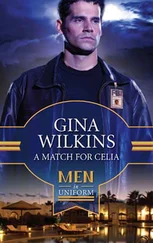The woman was curled into a fetal ball when he returned to her. He suspected that if there was enough light, he would see that her lips were blue. She wore a T-shirt and shorts, and her feet were bare. She’d probably lost her shoes in the river. She lay in a puddle of water, trembling.
“I’ve called for help,” he said, wrapping his jacket snugly around her. The thin fabric seemed to make no difference at all; she seemed hardly to notice it. Shock, he thought again, and shifted her onto her back, pushing her knees upward so that her legs were higher than her head.
Only marginally aware of his own soggy, chilled condition, he smoothed wet, nape-length hair from the woman’s face. His eyes had finally grown accustomed to the darkness and he could make out the woman’s features. Her skin was so pale it looked like porcelain in the milky moonlight. He took another guess at her age—mid- to late twenties, perhaps. Her hair looked dark, but it was hard to tell for certain. “What’s your name?”
“Sharon.” Her voice was faint, but coherent, to his relief. “Sharon Henderson.”
“I’m Mac Cordero.”
She pulled a hand from the folds of his jacket and reached out toward him. “Thank you.”
He cradled her icy fingers in his larger, somewhat warmer ones. Their gazes met and held. Her eyes glittered in the moonlight. He knew his own face was in shadow, but he offered a faint smile of encouragement. “You’re welcome.”
She shivered again and he tightened his hand. He felt as if something passed between them at that point of contact—warmth, emotion…something. Most likely he was overreacting to the dramatic turn the evening had suddenly taken. When he’d complained of boredom earlier, he certainly hadn’t been hoping for anything like this.
A dark Jeep with a flashing light on the dash topped the hill and braked to a stop across the road. The driver stepped out of the vehicle and crossed to them swiftly, kneeling at the woman’s other side. “Sharon?” he said, recognizing her immediately, “Are you hurt?”
“I don’t think so,” she answered, but didn’t sound quite convinced.
“An ambulance is on the way. Can you tell me what happened?”
“I was leaving Tressie’s house after dinner. There was a van—it came out of the driveway on the other side of the hill without stopping. I swerved, but it ran me off the road—almost as if it was intentional.”
“I saw the van,” Mac added. “It never even slowed down.”
The other man looked at him. “Chief Wade Davenport, Honoria Police Department,” he introduced himself.
“Mac Cordero. I happened to be following behind Ms. Henderson’s car, and I saw the accident.”
“Judging from your appearance, I take it Sharon’s car went into Snake Creek?”
Mac frowned. Snake Creek? Hardly a name to inspire confidence. He hated snakes. Yet he knew that even had the water been crawling with them, he’d have gone in after her. Years of training and practice had kicked in the moment he’d seen someone in trouble. You could take the cop out of his uniform, he thought ruefully, but it was a hell of a lot harder to break those old cop habits.
“My car.” Sharon turned her head to look mournfully toward the edge of the road. “I just made the final payment.”
Davenport patted her shoulder. “Let’s not worry about that right now, okay?”
A siren broke the deceptively peaceful silence of the night. Davenport glanced in its direction, then turned his attention back to the soggy couple in front of him. “You said the van pulled out of the driveway just over the hill?”
Sharon nodded. “Yes. The driver didn’t even pause to see if anyone was coming from either direction.”
“That’s the Porter place. The Porters left for vacation three days ago.”
“You think the van was there to rob them?” She sounded appalled.
The police chief glanced at Mac, who had already leaped to that conclusion, then looked back at Sharon. “I’ll check that out as soon as you’re taken care of. I don’t suppose either of you got the number of the license plate on the van.”
“No.” Mac shook his head, knowing he’d be able to provide little detail. “I thought it was more important to make sure no one was trapped underwater.”
“You made the right call.” Davenport stood as an ambulance pulled up behind the Jeep. “I’ll have more questions for you later, if you don’t mind, Mr. Cordero.”
“I’ll tell you everything I saw—but I’m afraid it wasn’t much. It all happened too quickly.”
Two uniformed paramedics—a man and a woman—approached with swift efficiency. Only then did Mac realize that he was still holding Sharon’s hand. She clung to him when he would have released her, as if he were her only lifeline in frighteningly uncharted waters. He had to gently peel her fingers away so the medics could do their jobs.
He hadn’t been cold when he’d knelt beside her, holding her hand. Now, as he stepped back, he felt a chill penetrate his wet clothing. He shoved his hands into the pockets of his slacks and winced when the waterlogged fabric clung to him. Fortunately, his wallet was in the truck, so the only thing he’d ruined was a good leather belt. His shoes were still by the water’s edge. He’d get them as soon as the ambulance left.
Wade Davenport returned from using the radio in his Jeep just as Sharon was being loaded onto the ambulance. “I’ll come to the hospital in a few minutes to see about you,” he promised her.
“All right,” she answered automatically, though she was still looking at Mac. “Mr. Cordero…”
He stepped closer to the gurney. “Yes?”
“Thank you.”
She had already thanked him. He answered as he had before, “You’re welcome.”
He watched her—and was watched in return—until the ambulance doors closed between them. Only when the ambulance had driven away did he turn back to the chief of police, prepared to answer his questions.
SORE MUSCLES CLENCHED when Sharon shifted in her seat Sunday evening, causing her to wince. She immediately regretted doing so when the man on the other side of the restaurant table frowned and asked, “Are you sure you’re all right?”
Since it was at least the tenth time he’d asked in the past couple of hours, Sharon had to force herself to answer patiently. “I’m fine, Jerry. Still a little sore, but the doctor assured me that was to be expected.”
Jerry Whitaker didn’t look satisfied. He seemed convinced that her injuries from Friday night’s mishap were worse than the few scrapes and bruises she had told him about.
He’d been out of town for the weekend, and when he’d returned that afternoon, talk of the accident had been all over town—no surprise in Honoria, where rumors zipped from household to household with the frantic speed of a metal ball in an arcade pinball machine. Having lived here since adolescence, Sharon had learned to discount most of what she heard, but Jerry still tended to take the local gossip much too seriously.
“Tell me more about your business trip,” she encouraged him, trying to change the subject. “How was the weather in Charleston?”
Her attempt at diversion failed. “Fine,” he answered automatically, then returned to his questions about her. “Have you talked to Chief Davenport since I called you this afternoon? Have there been any further developments in the investigation of the Porter robbery—any leads on the van that ran you off the road?”
Resigned to rehashing it all again, Sharon looked down at her plate. “Nothing. It’s as if the van disappeared off the face of the earth. If Mr. Cordero hadn’t seen it, I would have wondered if I had imagined it.”
Jerry’s scowl deepened. “Ah, yes. Cordero-the-hero. That’s what they’re calling him around town, you know.”
Читать дальше












